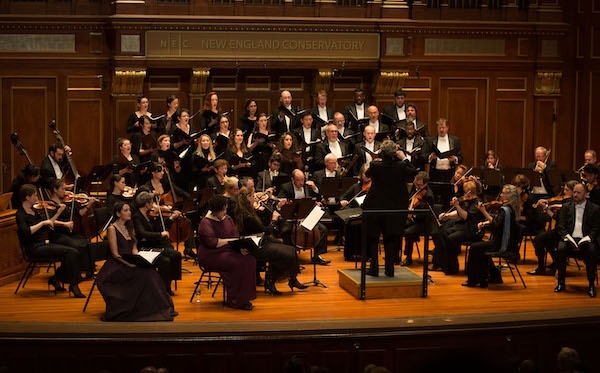Performing Arts Series: Stories of Surviving COVID-19 — Boston Baroque
“At Boston Baroque, as we look to the future, we take comfort in knowing that redefining ourselves is in our organization’s DNA.”

Boston Baroque in action. Photo: Kathy Wittman.
Editor’s Note:
What lies beyond COVID-19 for the arts community? In a recent e-mail, Boston Baroque wrote that it “understands that collective community experiences in places like concert halls will be forever changed by this pandemic.” I am asking small to medium performing arts organizations to talk about the forms this transformation will take, their plans for survival and the future. Double Edge Theatre has contributed its thoughts. Boston Baroque was kind enough to send in a statement.
— Bill Marx

Martin Pearlman, Founder and Music Director. Photo: Kareen Worrell.
By Martin Pearlman, Founder and Music Director, and Jennifer Ritvo Hughes, Executive Director
Coronavirus has unleashed an existential crisis for performing artists and arts organizations. Without the ability to gather together to listen, learn, and create, coronavirus has robbed the arts of the core of our identity. And yet, the arts have been incredibly active in the last eight weeks.
What at first blush may be a depressing prospect is actually a moment vibrating with potential. Like many organizations, Boston Baroque is putting content online. Boston Baroque Live, our new streaming platform, has debuted with a video of Handel’s opera Agrippina and will continue to add full-length operas and concerts from recent seasons. Streaming for organizations such as ours keeps us in touch with patrons and audiences, including audiences that are normally beyond our geographical reach, and it provides them with much-needed music for this difficult time. It also provides much-needed revenue for our musicians, who are unable to perform during this pandemic.
When will it be safe for artists and audiences to gather together again? At Boston Baroque we believe that the health and safety of our musicians must be a top priority, along with that of our audiences. Wearing masks is, of course, impractical for wind players and singers. That and the problem of having singers standing close together in a chorus are some of the issues that we have to be thinking about as we plan for the future.

Executive Director Jennifer Ritvo Hughes. Photo: Kareem Worrell
With all the uncertainty around when it will be safe to perform normal concerts again — and around whether some people will still be uncomfortable coming to them — we have had to start planning for several different possible scenarios and making budgets for each of them. What happens in one quarter will affect what we can do in the next. Will we be able to perform live concerts next season? If so, will we need to simultaneously play for an audience and stream the concert live for those who do not yet want to go to a concert hall? What will a subscription look like in the coming season? These and many other issues mean that an arts group must be nimble and prepare for different scenarios depending on how circumstances develop.
At Boston Baroque, as we look to the future, we take comfort in knowing that redefining ourselves is in our organization’s DNA. Nearly 50 years ago, we started up as the first period-instrument orchestra in the country, and in that sense, we’ve been in uncharted territory ever since. While we will hold fast to our commitment to perform music on our period instruments that is vibrant and moving for modern audiences, we are also committed to embracing the opportunities that lie before us.
Note: Boston Baroque will be releasing full-length opera productions and concerts of choral and orchestral works across multiple video platforms that can be accessed at Boston Baroque Live, a new portal on the Boston Baroque website. Handel’s Agrippina is currently available to stream for free on Boston Baroque Live.
Tagged: Boston Baroque, COVID-19, Jennifer Ritvo Hughes
